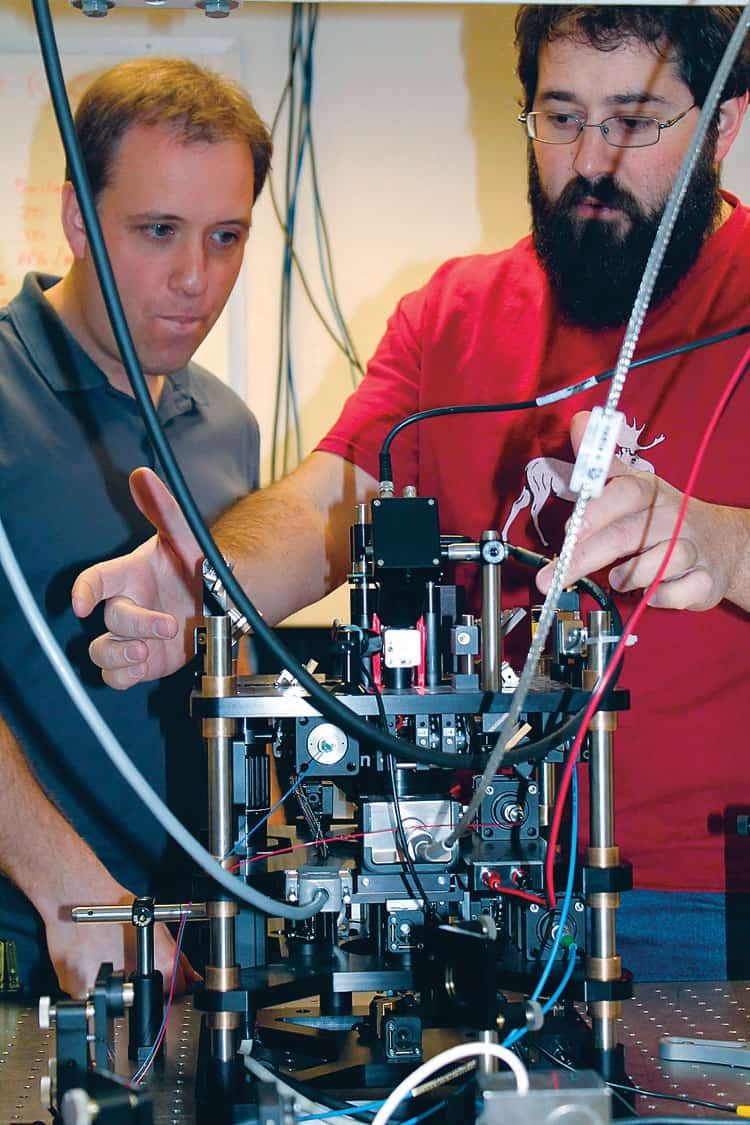For ColdQuanta’s team, ultracold matter matters

BOULDER — Workers at ColdQuanta Inc. believe that “ultracold” atom technology created with a device made by the company will be used in a variety of common applications in the future.
The technology may be used in inertial sensing devices that change a smartphone screen from vertical to horizontal, according to Evan Salim, a scientist at Boulder-based ColdQuanta. Or it can be used in submarine navigation devices and other navigation instruments, he said.
Magnetic field applications, which are used to figure out where to drill for oil or mine for minerals, could benefit from the technology, Salim said, as could the magnetic resonance imaging, or MRI, machines used to scan patients.
“Ultracold” matter — in this case using rubidium — goes by the formal term Bose-Einstein condensate, a state of matter that exists near absolute zero, a physical substance that exists near absolute zero, which is 459.67 degrees below zero Fahrenheit.
The Boulder-based company recently made a vacuum device it calls the RuBECi, which simplifies the process of creating the ultracold matter in a commercial setting. Before now, Bose-Einstein condensate had only been created at universities and government research labs.
“We make systems that are easier to use and more compact. The advantage of making it small and easy to use, is that it’s now something potentially useful for applications where size matters, like an airplane or a submarine or a spaceship,” Salim said. “We have taken the complexity out of producing states of ultracold matter.”
ColdQuanta sells its devices for $20,000 to $500,000, said Seema Hess, a company spokeswoman. Prices range widely based on what additional equipment is used on the device, including cameras and lasers. Lasers needed to help the device operate are sold separately, Hess said.
The device uses laser beams and magnetic fields to cool atoms, slow them down and trap them to a point where classical physics is “no longer sufficient to describe what’s happening to the atom,” Salim said.
Other research applications include quantum simulators, which are used to study how various materials react to extremely hot and extremely cold temperatures, Salim said. Defense-related research has focused on cryptography that can be helped with applications from the device. Universities also may be interested in buying the devices to give students a chance to conduct modern experiments in physics, Salim said.
While other companies are building instruments that can achieve Bose-Einstein condensate, ColdQuanta’s device is the first one available commercially, according to Rainer Kunz, the company’s chief executive. The company also makes and sells related materials.
Bose-Einstein condensate was first created by University of Colorado scientists Eric Cornell and Carl Wieman, who received Nobel prizes for their work in 2001. ColdQuanta was founded in 2007 to commercialize work at CU to develop streamlined devices for Bose-Einstein experiments. ColdQuanta has a licensing agreement with the university to commercialize the technology.
ColdQuanta added seven new employees in 2012, growing to 17 people, Hess said. The company in May said it received more than $1 million in contracts from the U.S. Navy and NASA related to the technology. Research into ultracold matter has taken off throughout the world since Cornell and Wieman first announced results of their work.
BOULDER — Workers at ColdQuanta Inc. believe that “ultracold” atom technology created with a device made by the company will be used in a variety of common applications in the future.
The technology may be used in inertial sensing devices that change a smartphone screen from vertical to horizontal, according to Evan Salim, a scientist at Boulder-based ColdQuanta. Or it can be used in submarine navigation devices and other navigation instruments, he said.
Magnetic field applications, which are used to figure out where to drill for oil or mine for minerals, could benefit from the technology, Salim said, as could the magnetic…
THIS ARTICLE IS FOR SUBSCRIBERS ONLY
Continue reading for less than $3 per week!
Get a month of award-winning local business news, trends and insights
Access award-winning content today!
